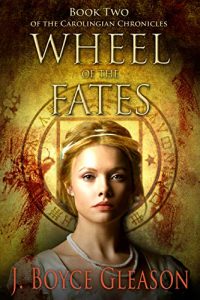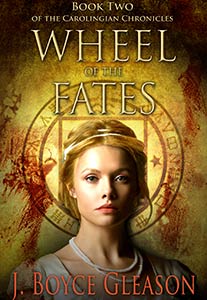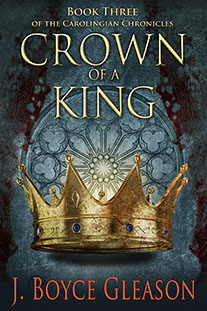At the last Historical Novel Society Annual meeting I participated in a “two-page read” where authors submit the first two pages of their new novels to be read aloud and critiqued by agents and publishers. Here is my submission from Wheel of the Fates, Book Two of the Carolingian Chronicles
Chapter One
Pippin stood at the rampart, broadsword across his back, scowling at the sun as it fell toward the horizon. Although not a tall man, he was an imposing figure with the shoulders of a blacksmith and the casual grace of a swordsman. Those passing gave him a wide berth; some even chose a different path. The people of Laon had had enough of warriors. And from the looks Pippin received, they blamed him as much as Carloman for their plight.
Although Pippin’s brother had never taken the city, he had breached its wall and killed nearly a third of those defending it to arrest their half-brother, Gripho. The hectare-sized burial mound on the south plain was a stark testament to the cost of the siege.
Inside the city walls the costs were no less evident. Scores of newly widowed women filled the main plaza, selling their household goods in a vain attempt to sustain what was left of their families. From the din of their pleading, their need was palpable.
He should have left weeks earlier, but had refused to go without Bertrada. She had broken their courtship over the siege, stating she wanted nothing further to do with the brutality of his family. She had hidden in her father’s house and refused all Pippin’s entreaties. And while Pippin had made it clear that he would not leave without her, he was running out of time. His knights were assembling for the spring campaign. He would have to leave for Paris in the morning.
The standoff was taking a heavy toll on him. He had taken to drink and could not remember the last time he had slept through the night or eaten a decent meal.
But, tonight would change everything, Pippin promised himself. He even had bathed and put on fresh clothes. When he looked down over the wall at the burial mound below, however, his confidence faltered. “Why did you have to hang that boy, Carloman?”
Something caught the corner of his eye, triggering his senses to high alert. His eyes searched the entryways on the street and checked the windows, the rooftops and alleyways. Keeping his stride casual, he changed vantage points and searched again, but failed to identify the source of the movement.
His nostrils flared and his skin prickled in the cold wind. His hand moved to the dagger at his belt. Where was the threat? His sense of jeopardy stabbed at him like sunlight off an enemy’s shield.
You’re stalling, he scolded himself. The day was ending; it was time. With a grim determination he began his trek up the main road while a familiar litany gnawed at the corners of his mind. He tried to ignore it, tried to keep it buried and hidden from sight, but it rose, nonetheless, to assert itself – what if I am not worthy?
As he ascended the street, his pace began to slow. And then, he stopped moving altogether. He had known knights in battle like this, too wounded to continue fighting yet too proud to retreat. They turned to face their opponents as if the sheer force of their will could sustain them. It never did.
He turned into the forecourt of Bertrada’s villa and whispered a short prayer that this night would be different.
 Set to Launch April 20th!
Set to Launch April 20th!

